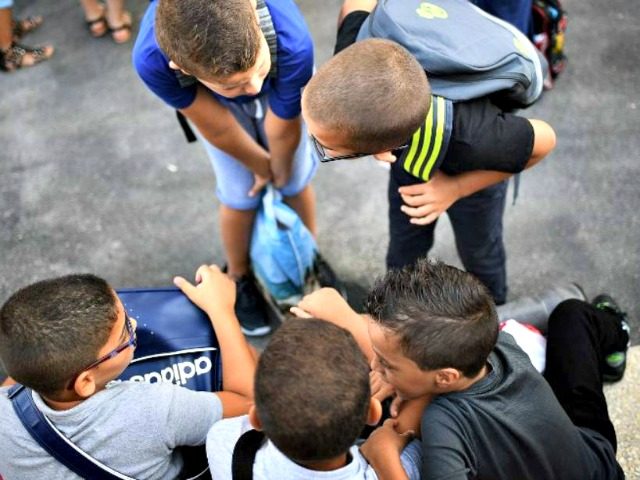Only 15 percent of eighth graders in the United States scored at or above proficiency level in U.S. history on the 2018 assessments known as the Nation’s Report Card, the National Center for Education Statistics (NCES) revealed Thursday.
Eighth graders in the United States once again showed a decline in U.S. history and geography test scores, and made no progress in civics, according to the assessment results.
Scores in U.S. history and geography plunged between 2014 and 2018. Approximately 43,000 eighth graders took the assessment in early 2018.
The 2014 results showed 18 percent of eighth graders were at or above the proficiency level in U.S. history.
According to the National Assessment of Educational Progress (NAEP), the U.S. history assessment measures:
[S]tudents’ knowledge and understanding of U.S. history in all its complexity—its major themes, periods, events, people, ideas, and turning points. The assessment examines students’ understanding of historical chronology, differing perspectives across time, and their grasp of historical facts and contexts.
Average scores in U.S. history dropped four points between 2014 and 2018, from 267 to 263 on a scale of 0 to 500.
“Scores were lower across all levels of performance except the very top-performing students—those at the 90th percentile—whose score did not change,” NAEP reported.
Tune in at 1:30 pm EDT for the virtual release of the NAEP 2018 #socialstudies report cards! In addition to hearing from @EdNCES and @GovBoard, you'll also hear perspectives from civics, geography, and U.S. history experts and teachers. Info: https://t.co/AziiScc6XH pic.twitter.com/cTBWTniEQ3
— NAEP (@NAEP_NCES) April 23, 2020
“These results are another indication that the achievement of already low performing students has been declining relative to higher-performing students,” said Lynn Woodworth, commissioner of NCES.
In geography, the 2018 eighth-graders’ average score was three points lower than that in 2014, dropping from 261 to 258.
Only 25 percent of eighth-grade students scored at or above the proficiency level in geography in the latest results.
The 2018 civics test scores showed no statistically significant change from 2014, and, consequently, no improvement in eighth grade scores between the years in schools. The 2018 average score was 153, compared to that of 2014, which was 154.
Only 24 percent of eighth-graders performed at or above the proficiency level in civics on the assessment administered in 2018.
NAEP states the civics assessment measures, “[S]tudents’ knowledge of American government as well as their ability to participate in civic activities.”
U.S. Department of Education Secretary Betsy DeVos called the results on the Nation’s Report Card “inexcusable”:
America’s antiquated approach to education is creating a generation of future leaders who will not have a foundational understanding of what makes this country exceptional. We cannot continue to excuse this problem away. Instead, we need to fundamentally rethink education in America. It is the only way our nation’s students will be in a position to lead our nation and the world.
Peggy G. Carr, associate commissioner of assessment at the National Center for Education Statistics (NCES), which runs the NAEP, also said in a statement, “These assessments challenge students to show their knowledge and skills as they prepare to become full participants in American democracy.”
Though the 2018 tests were administered to students long before the current coronavirus crisis that has produced school closures and seen students switched to online classwork, some officials expressed concern that keeping schools closed will lead to gaps in learning.
Carr said the current coronavirus outbreak is providing the nation with a “teachable moment … in terms of how important it is to understand historical forces, the role of our civic institutions, and the impact of geographical conditions of our interconnected world.”
Her observations suggest a concern that U.S. students have failed to learn critical thinking skills.
“The results provided here indicate that many students are struggling to understand and explain the importance of civic participation, how American government functions, the historical significance of events, and the need to grasp and apply core geographic concepts,” she said.
DeVos said that “in the real world,” the Nation’s Report Card results indicate “students don’t know what the Lincoln-Douglas debates were about, nor can they discuss the significance of the Bill of Rights, or point out basic locations on a map.”
“And only 15% of them have a reasonable knowledge of U.S. history,” she added. “All Americans should take a moment to think about the concerning implications for the future of our country.”

COMMENTS
Please let us know if you're having issues with commenting.